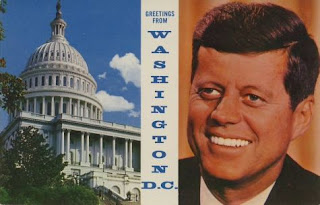My friend Mickey, for example. He spent almost his entire childhood and college years in Northern Virginia and then moved to Los Angeles and has been there ever since. My younger brother was born in Ohio, but we moved to Virginia when he was 3 and he has lived there ever since.
 |
| 1963 |
It's where my first marriage began and ended, and I think where my first wife still lives. It's where I made almost all the friendships in my life that lasted, and it's where my 29-year career in newspapers got its start.
It's where we buried my dad five years ago, and it's where my brother, my youngest sister and many of my friends still live.
When we moved from Ohio to Virginia in January 1963, there was one big disappointment. I had sort of discovered rock 'n' roll the previous summer, and I spent hours in the afternoons and evenings listening to "high-flying WING," Dayton's No. 1 station. But I was disappointed to see that the Washington, D.C., area in early 1963 had only two decent rock stations -- WEAM and WPGC -- and one of them was directional in the opposite direction at night and the other one broadcast only on FM after sundown.
I don't think I had an FM radio until 1971.
By ninth or 10th grade I discovered wonderful stations in faraway places, but that winter there was just nothing I liked on the radio at night. So I found myself listening to one of the two local stations I could get. WMAL had soft jazz and WTOP had news. I didn't much like jazz, but I loved the two-minute signoff at midnight that carried WMAL into the all-night show.
It was wonderful. I was just at the age where I could appreciate living near one of the world's great cities, and there was so much pride at realizing what was happening downtown. We had an extremely conservative Republican congressman living next door, but when I checked his voting record from 1964, I saw that he had voted for the Civil Rights Act that year and then voted yes again in 1965 for the Voting Rights Act.
They were different times.
When I listened to the jingle on YouTube, it gave me an amazing feeling. There are plenty of other pieces of music from 50 years ago that bring back memories, but there is nothing else I can remember from that time that I was hearing for the first time since 1963.
Goose bumps?
You bet.
"That's why we like to be in Washington, D.C. ..."
.jpg)























.jpg)
















